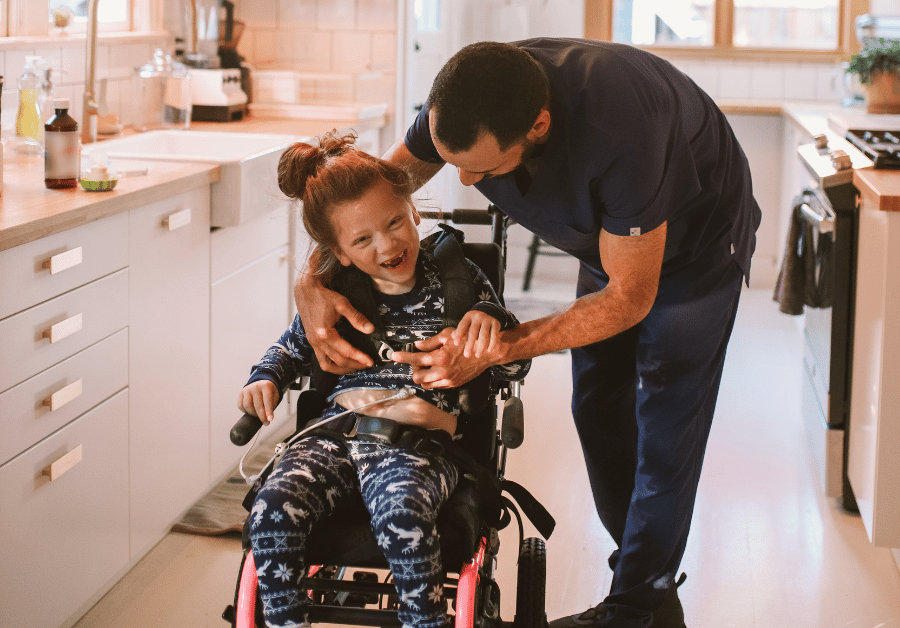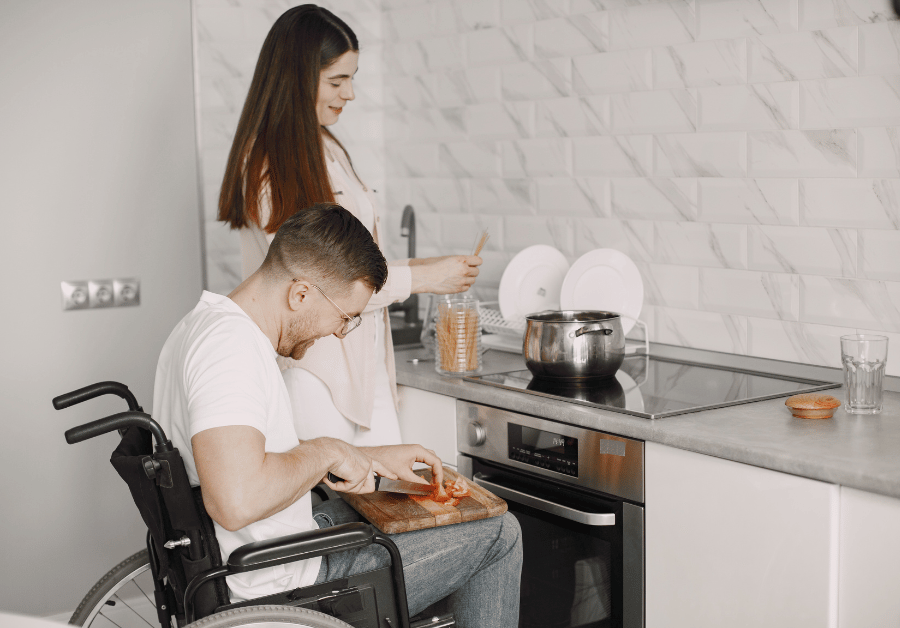Supportive Living for Disabled Adults in Australia
Supportive Living for Disabled Adults: Finding the Right Fit in Australia
Finding the right living arrangement is crucial for the well-being and independence of people with disability. This guide explores supportive living for disabled adults in Australia, focusing on options available in cities like Adelaide, Sydney, Melbourne, Perth, Brisbane, and Hobart. We'll delve into various types of housing options, disability services, and how to navigate the disability gateway to access the support you need.
Understanding Supportive Living

Supportive living refers to a range of housing and support services designed to enable people living with disabilities to live as independently as possible. It's about creating an environment where individuals can exercise choice and control over their lives while receiving the necessary support to thrive. This can range from minimal assistance to 24/7 care, depending on the individual's needs.
What Does Supportive Living Include?
- Personal Care: Assistance with daily tasks like showering, dressing, and meal preparation.
- Medication Management: Ensuring medications are taken correctly and on time.
- Household Tasks: Support with cleaning, laundry, and grocery shopping.
- Social and Community Engagement: Facilitating participation in social activities and community events.
- Therapy and Rehabilitation: Access to therapies like physiotherapy, occupational therapy, and speech therapy.
- Employment Support: Assistance with finding and maintaining employment.
- Emotional Support: Providing a safe and supportive environment where individuals feel valued and respected.
Types of Supportive Living Options in Australia
Australia offers a diverse range of supportive living options to cater to the varying needs of adults with disabilities. Let's explore some of the most common choices:
Supported Independent Living (SIL)
Supported Independent Living (SIL) is a type of disability support where people with disability live in a shared home and receive support with daily living tasks. This support is typically funded through the National Disability Insurance Scheme (NDIS). SIL aims to foster independent life skills and social inclusion.
Alliance Care Support in Adelaide specialises in providing high-quality SIL services. Their NDIS-approved homes are designed to be accessible and comfortable, promoting a sense of belonging and empowerment. Contact them at support@alliancecaresupport.com.au to learn more.
Group Homes
Group homes are residential homes that provide 24/7 support for a small group of people with disability. These homes offer a structured environment with dedicated staff to assist with all aspects of daily living. Group homes can be a good option for individuals who require a high level of support.
Disability group homes offer a community environment, allowing people living with disabilities to build friendships and develop social skills. Some organisations, like Sana Living, operate disability group homes across Perth, Brisbane, and Adelaide.
Community Housing
Community housing provides affordable housing options for people with disability who are able to live relatively independently. This type of housing may include modifications to make it accessible and may be combined with other disability services.
Community housing can be a great way for people with disability to integrate into their local community and maintain their independent living. Resources like the disability gateway and services Australia can help you findcommunity housing providers in your area.
Specialist Disability Accommodation (SDA)
Specialist Disability Accommodation (SDA) refers to housing designed for people with very high support needs. These homes often include specialised features and equipment to ensure safety and accessibility. SDA funding is available through the NDIS.
In-Home Support
For those who prefer to remain in their own home, in-home support services can provide assistance with a range of tasks, from personal care to household chores. This option allows individuals to maintain their independence while receiving the support they need.
Alliance Care Support in Adelaide also offers comprehensive in-home support services tailored to individual needs. This allows people with disability to continue living home and within their community. Their team can provide assistance with personal care, medication management, and other daily living tasks. You can reach them at support@alliancecaresupport.com.au.
Navigating the National Disability Insurance Scheme (NDIS)
The National Disability Insurance Scheme (NDIS) is a game-changer for people with disability in Australia. It provides funding for a wide range of support services, including supportive living. To access NDIS funding, you'll need to go through an assessment process to determine your eligibility and needs.
Steps to Accessing NDIS Funding for Supportive Living:
- Determine Eligibility: Check if you meet the NDIS eligibility criteria.
- Apply for the NDIS: Complete the application form and provide supporting documentation.
- Attend a Planning Meeting: Meet with an NDIS planner to discuss your goals and support needs.
- Develop a Plan: Work with the planner to create an individualised plan that outlines the support you'll receive.
- Implement Your Plan: Start using your NDIS funding to access supportive living services.
Choosing the Right Supportive Living Option

Selecting the right supportive living arrangement is a personal decision that should be based on individual needs, preferences, and goals. Consider the following factors when making your choice:
- Level of Support: How much assistance do you require with daily living tasks?
- Location: Do you prefer to live in a particular area, close to family, friends, or services?
- Cost: How much can you afford to spend on housing and support?
- Lifestyle: What kind of environment do you thrive in? Do you prefer a quiet setting or a more social atmosphere?
- Accessibility: Does the housing meet your accessibility needs (e.g., wheelchair access, adapted bathrooms)?
- NDIS Funding: What support services are covered by your NDIS plan?
Resources and Support for People with Disability in Australia
Australia offers a wealth of resources and support services for people with disability and their families. Here are some helpful organisations:
- National Disability Insurance Agency (NDIA): The government agency responsible for administering the NDIS.
- Disability Gateway: A national online and phone service that provides information and referrals to disability services.
- IDEAS (Information on Disability, Education and Awareness Services): IDEAS provides free, accurate and independent information about services and supports for people with disabilities, their families, carers and service providers.
- Australian Federation of Disability Organisations (AFDO):Australia's peak body representing people with disability.
In Adelaide, Alliance Care Support is also a valuable resource. They provide tailored care, support, and resources to empower individuals with disabilities. With a focus on Supported Independent Living (SIL), in-home care, and respite services, they create environments that foster independence and enhance quality of life. Their NDIS-approved homes are equipped with accessibility features, ensuring safety and comfort for participants. Their mission is to help clients achieve their personal goals while receiving compassionate care, enabling them to lead fulfilling lives in a supportive community.
The Importance of Independent Living
Independent living is about empowering people with disability to make their own choices and live their lives to the fullest. It's about breaking down barriers and creating a society where everyone has the opportunity to participate and contribute.
Benefits of Independent Living:
- Increased Self-Esteem and Confidence: Gaining control over your life can boost your self-esteem and confidence.
- Improved Social Connections: Living independently can facilitate social interaction and build stronger relationships.
- Enhanced Skills and Abilities: Managing your own home and life can develop new skills and abilities.
- Greater Choice and Control: You get to decide how you want to live your life, without being dictated to by others.
- Increased Inclusion and Participation:Independent living allows you to participate more fully in your community.
Mobility Aids and Equipment for Independent Living

Mobility aids and equipment can play a vital role in enabling people with disability to live more independently. From wheelchairs and mobility scooters to adapted kitchen utensils and bathroom aids, there's a wide range of products available to make daily tasks easier.
Independent living specialists can assess your needs and recommend the most appropriate aids and equipment. Leading providers offer a diverse selection of products, including walkers, wheelchairs, and mobility scooters. They can offer advice on the best solutions to enhance your mobility and independence.
Support for Younger People at Risk of Entering Residential Aged Care
Ready to find the right supportive living option?
Contact Us TodayIt is crucial to ensure that younger people with disabilities are not forced to live in aged care facilities simply because there are no suitable housing options available. The government has initiatives in place to provide support for younger people who are at risk of entering residential aged care, offering them more appropriate living arrangements.
These initiatives aim to provide younger people with disabilities with the opportunity to live in age-appropriate settings, where they can access the support they need to live fulfilling lives. The disability gateway provides information on available services and supports.
Cerebral Palsy and Supported Living
Cerebral palsy is a condition that can affect a person's mobility and coordination. Supported living can provide valuable support for individuals with cerebral palsy, enabling them to live as independently as possible. This support may include assistance with personal care, household tasks, and accessing therapy and rehabilitation services.
Leading global centres offer specialised cerebral palsy support, providing comprehensive assessment, treatment, and support services to help individuals with cerebral palsy achieve their goals. These services can include physiotherapy, occupational therapy, speech therapy, and assistive technology.
In contrast, group homes offer 24/7 support in a more structured environment, typically for people with higher care needs. Community housing, on the other hand, is geared towards those who can live more independently and may need only minimal support. It often includes affordable housing with optional wraparound services. The best option depends on individual needs, goals, and preferences.
Check Eligibility: You must meet NDIS eligibility criteria, which include age, residency, and disability-related needs.
Apply for NDIS: Submit an application with supporting medical and personal documents.
Planning Meeting: Attend a meeting with an NDIS planner to discuss your goals, living needs, and support options.
Receive Your Plan: Your NDIS plan will detail the types of supports and funding you're eligible for, including Supported Independent Living (SIL) or other options.
Choose a Provider: Once your plan is approved, you can connect with NDIS-registered providers like Alliance Care Support to begin receiving services.
Conclusion
Finding the right supportive living arrangement is a journey, but with the right information and support, you can make an informed decision that empowers you to live a fulfilling and independent life. Whether you're in Adelaide, Sydney, Melbourne, Perth, Brisbane, or Hobart, Australia offers a range of options to suit your needs and preferences. Remember to explore the resources available through the NDIS, disability gateway, and local disability services organisations.
If you're in Adelaide and seeking supportive living options, consider reaching out to Alliance Care Support. They are dedicated to empowering individuals with disabilities by providing tailored care, support, and resources. Their NDIS-approved homes and in-home support services can help you achieve your personal goals and live a more independent life.
Learn more about how Alliance Care Support can help you by visiting their website: https://www.alliancecaresupport.com.au
